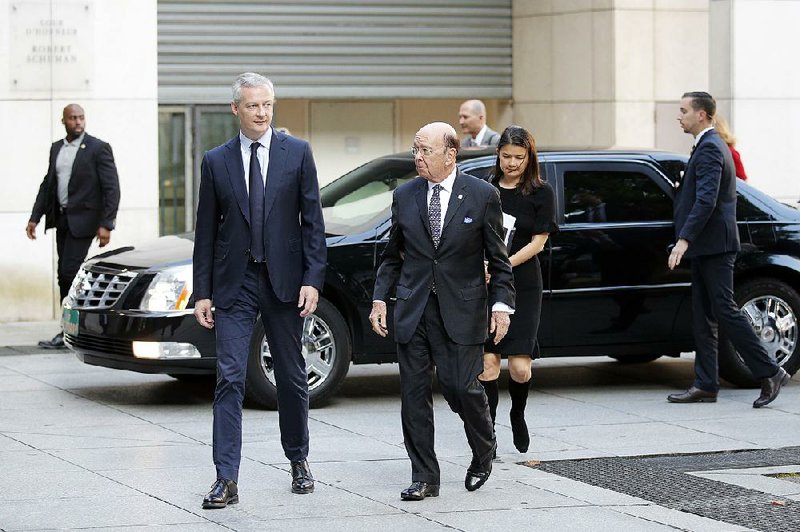WASHINGTON -- The Trump administration said Thursday that it would impose tariffs on metals imported from its closest allies, a move sure to provoke retaliation against businesses and consumers in the United States, and to further strain diplomatic ties tested by President Donald Trump.
Tariffs of 25 percent on steel and 10 percent on aluminum from the European Union, Canada and Mexico, which together supply nearly half of the United States' imported metal, were to take effect just after midnight Thursday, said Commerce Secretary Wilbur Ross.
Officials in Europe, Canada and Mexico responded quickly, denouncing the tariffs and warning of retaliation measures, some aimed at goods like pork, steel, bluejeans, bourbon and cheese from the parts of the United States where Trump has his strongest political support.
French President Emmanuel Macron called the U.S. decision to levy tariffs on the European Union "illegal" and a "mistake." He recalled the pre-World War II period saying, "Economic nationalism leads to war. This is exactly what happened in the 1930s."
In Canada, Prime Minister Justin Trudeau said: "These tariffs are totally unacceptable."
"That Canada could be considered a national security threat to the United States is inconceivable," he added, as his country announced plans to slap tariffs on $12.8 billion worth of U.S. products, including steel, yogurt and toilet paper.
The tariffs are being imposed under a 1960s legal measure related to protecting U.S. national security. The Trump administration has argued that imports have weakened the country's industrial base, and, by extension, its ability to produce tanks, weapons and armored vehicles.
The action was mainly targeted at China over accusations of flooding the global market with cut-rate metals and dragging down prices. The Trump administration has said a global tariff is necessary because China is shipping its steel through other nations.
The move follows months of uncertainty during which the Trump administration dangled potential exemptions to the tariffs in return for concessions on other fronts, including voluntary limits on metal shipments to the United States and reduced tariffs on imports from the United States.
In trying to create leverage in trade negotiations by keeping its trading partners guessing, the administration sowed an atmosphere of chaos among allies as well as manufacturers uncertain about the ultimate effect on their vast supply chains. And on Thursday, the Trump administration said it hoped to continue to negotiate with the affected countries, creating further confusion among business owners and foreign leaders.
After the metal tariffs were first announced in March, the countries targeted Thursday secured temporary exemptions while the administration continued to negotiate with Canada and Mexico over the North American Free Trade Agreement and with European officials over other trade-related matters.
Ross said Thursday that although talks with the Europeans had continued, there had not been enough progress to warrant either another temporary reprieve or a permanent exemption.
The White House late Thursday released a statement from Trump saying of the trade deal: "The United State [sic] will agree to a fair deal, or there will be no deal at all."
The tariffs are meant to fulfill Trump's promises to defend U.S. industry. But they have prompted a fierce response from U.S. allies that argue that the measures violate international trading agreements.
European officials are preparing to impose retaliatory levies on an estimated $3 billion of imported U.S. products later in June. In a joint statement, France's foreign affairs and economy ministers and Germany's economy minister said the two countries would coordinate their response.
In addition to Canada, Mexico announced retaliatory tariffs of its own Thursday, targeting imports from the United States that included flat steel, lamps, pork products and prepared meat products, apples, grapes, cranberries and cheeses -- goods chosen for maximum impact in areas that have supported Trump.
Combined with similar measures being prepared by China, Russia and Turkey, the effect of the penalties on U.S. goods is expected to be severe.
Jean-Claude Juncker, president of the European Commission, called the tariffs announced by the White House on Thursday "protectionism, pure and simple." Juncker added that the United States had left Europe no choice but to proceed with a case at the World Trade Organization and its own tariffs on U.S. products.
Some companies in the United States commended the move.
Century Aluminum, which has supported the tariffs, said the action "protects thousands of American aluminum workers and puts U.S. national security first."
But many other businesses have objected, including construction companies and manufacturers that rely on steel and aluminum to make other products. The tariffs have raised the price of doing business for such companies and have added uncertainty about the price and availability of the metals in the future.
The Federal Reserve's latest Beige Book, a collection of anecdotes about the health of regional economies that was released Wednesday, contains more than two dozen references to business fears that the administration's trade policies, and the steel and aluminum tariffs, in particular, would hurt sales and profits.
Heidi Brock, president of the Aluminum Association, which represents most of the aluminum producers in the United States, said Thursday that the group was "disappointed" by the announcement. She said the tariffs would do little to address the larger issue of overcapacity in China "while potentially alienating allies and disrupting supply chains that more than 97 percent of U.S. aluminum industry jobs rely upon."
U.S. farm groups also took issue with the move. Brian Kuehl, executive director of Farmers for Free Trade, said the announcement "opens the floodgates to billions in new tariffs on American agriculture" from Canada, Mexico, China, India and Europe.
House Speaker Paul Ryan said there are better ways to help American workers and consumers and that he plans to work with Trump on "those better options."
Sen. Ben Sasse, R-Neb., called the tariffs "dumb" and said they hearkened back to the Great Depression.
"Europe, Canada and Mexico are not China, and you don't treat allies the same way you treat opponents," Sasse said.
"We've been down this road before -- blanket protectionism is a big part of why America had a Great Depression. Make America Great Again shouldn't mean Make America 1929 Again."
The European Union and Canada have objected strongly to the national security argument for the tariffs, citing their close alliance and defense agreements with the United States, and they have pledged to challenge the rationale at the World Trade Organization.
Last week, the Trump administration cited national security when it said it was starting a similar investigation into imported cars, expanding its campaign to a market many times larger than the steel and aluminum industry. The vast majority of vehicles imported into the United States come from Canada, Mexico, the European Union, South Korea and Japan.
"Our view of this one-sided move by the Americans is that it violates the law," said Heiko Maas, Germany's foreign minister. "We view the argument of protecting U.S. security as grounds for levying tariffs on steel and aluminum -- and to consider doing so on automobile imports -- to be inapplicable."
Europe and other members of the European Union will respond accordingly, he added.
"We have always made clear to the Americans that we have no interest in a trade war between the EU and the USA," he said.
While Ross insisted Thursday that any issues related to Mexico and Canada were purely based on national security concerns, Trump had previously tied the possibility of tariff exemptions for Canada and Mexico to the progress over talks for NAFTA.
Those talks have stalled in recent weeks amid significant differences over matters like the rules governing automobile manufacturing in North America.
Information for this article was contributed by Ana Swanson of The New York Times; by Ken Thomas, Paul Wiseman, Martin Crutsinger, Christopher Rugaber, Marcy Gordon, Jill Colvin, Kevin Freking, Angela Charlton, Alex Turnbull, Lorne Cook, Raf Casert, Christopher Sherman, Rob Gillies and Barry Hatton of The Associated Press; and by Andrew Mayeda, Jenny Leonard and Joe Deaux of Bloomberg News.
Business on 06/01/2018

